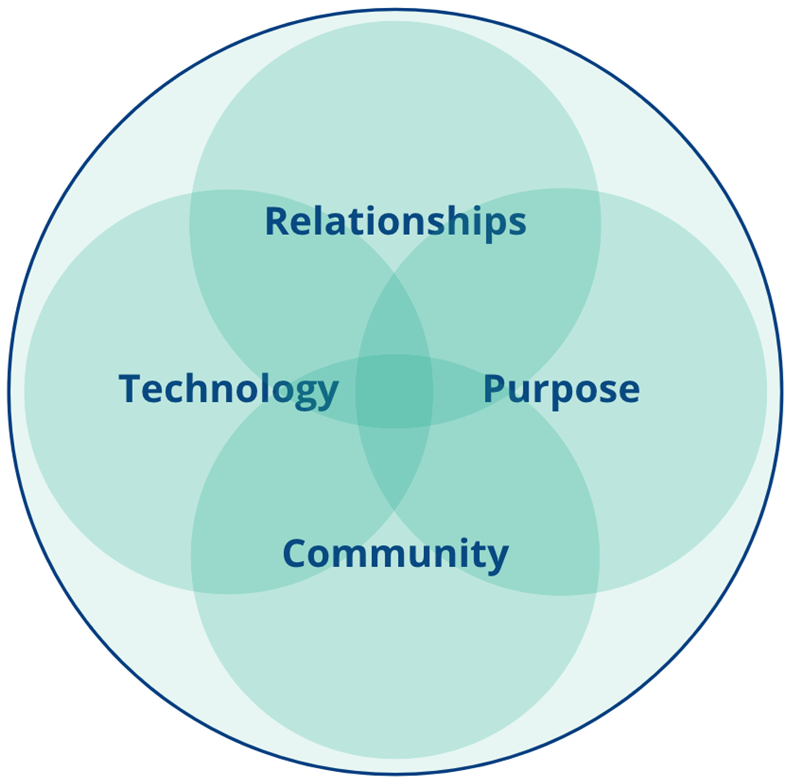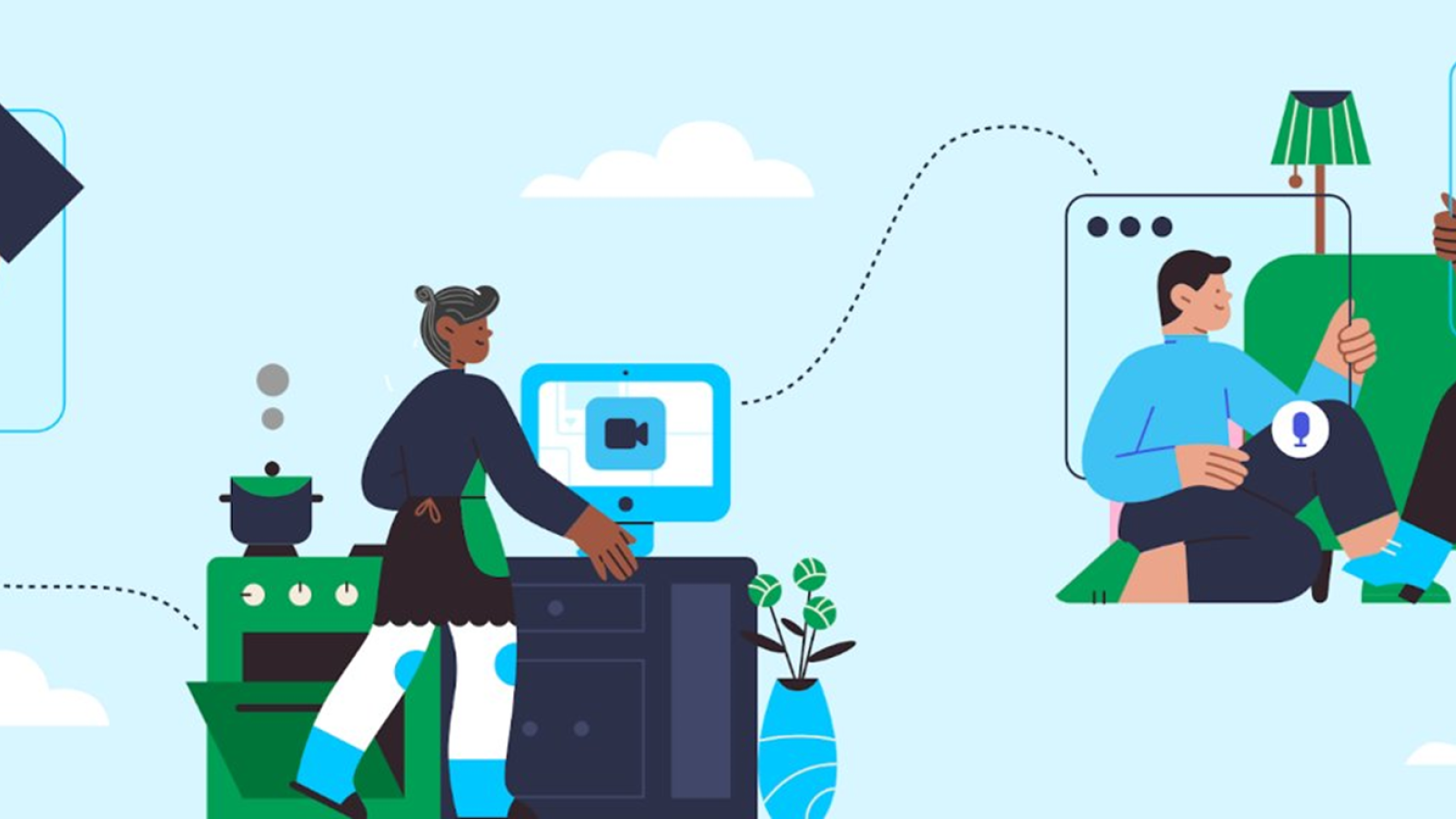The Covid-19 pandemic and lockdowns had a huge impact around the world, forcing millions of people into isolation. For those living with dementia and their carers, this was especially difficult as many had relied on in-person community groups to meet up with others. To help those with dementia stay connected at this time, the Community Makers project was established to support groups transitioning online with resources such as technical advice and monthly forums. We take a look at how Community Makers - formed from a collaboration between the UK DRI’s Care Research & Technology (CR&T) centre, the Helix Centre, Alzheimer’s Society and the University of Worcester - has developed and what’s next for the project.
Setting up Community Makers
The UK DRI CR&T centre works closely with the Helix Centre on the Minder programme, developing technology to support people living with dementia and helping them live independently in their homes for longer. A human-centred design process is used for Minder to ensure that the technology created is suitable for use in the homes of people with dementia. This is usually performed through face-to-face meetings and home visits to discuss the technology with the study participants, however, when the pandemic began, this was no longer possible and meetings were forced online.
It soon became apparent that the study participants were benefiting greatly from the social aspect of these meetings and as a result, the idea of a virtual community centre was born. A small team from the CR&T centre, the Helix Centre, the Alzheimer’s Society Innovation Team and the University of Worcester quickly created the Community Makers project, working together and drawing upon their respective expertise. Important aspects included identifying the requirements of people living with dementia and how this evolved over the pandemic; designing the website; connecting and communicating with community groups across the UK; and coordinating the monthly newsletters and meetings with organisers of the community groups.
people living with dementia in the UK
Developing the network
Whilst the Community Makers project originally started out as a virtual community centre, it became clear from focus groups that community leads were eager to learn and share knowledge with each other. Therefore, rather than being one large virtual social group for people living with dementia and their carers, the project became the Community Makers Network, providing community leads with the advice and guidance they needed to set up their own virtual community groups. This approach built on existing trusting relationships, which proved to be very important for a demographic that was nervous about embracing new technologies. Furthermore, it improved the skills of existing groups, empowering them to offer approaches that are a hybrid of digital and face-to-face services as the pandemic restrictions ease.
The Community Makers Network now involves monthly forums with the different community leads, giving members an easy means by which to socialise, gather ideas and share case studies. One example is of the charity Alive that partnered with the company Meetupcall to adapt a teleconferencing solution to social groups of older people and those living with dementia, as a more accessible alternative to video calls.
A website for the Network has also been created, providing resources to support online engagement. This includes guides about using different types of technology to socialise online, from choosing the right type of software that’s suitable for a group’s needs to advice on setting up different pieces of hardware. In addition, the website provides ideas for virtual events, as well as insights into what strategies for online meetings work well. For example, while live events, such as singing sessions, were popular for some groups, others preferred personalised, pre-recorded videos, such as of scenic walks of favourite areas, that members could then chat about.

Principles and goals
As the Community Makers project has evolved, the team have developed a framework of four guiding principles that they believe are key to making new online groups successful. These principles are: relationships, purpose, technology and community. They ensure that people have trust in the online community groups being set up and that these groups can understand and cater for the different reasons that people may want to join them. Furthermore, it is important that the technologies used are suitable for different people with different requirements to enable them to engage with the group activities and connect with the other members of the community.
One community group that was established because of Community Makers was Dementia Matters Here(fordshire). This success story began with the focus of using digital technology to support people living with dementia in the Hereford region by arranging video call meetings. They have subsequently moved to face-to-face, as lockdown measures eased. In addition, Cherry Evans, Dementia Supportive Community Connector at the Pembrokeshire Association of Voluntary Services, has run an online Tea and Natter group after receiving support through the Community Makers Network.
Community Makers gave me the knowledge and tools to continue providing opportunities for people living with dementia to feel part of something.Cherry EvansDementia Supportive Community Connector at the Pembrokeshire Association of Voluntary Services
What’s next?
As the pandemic and lockdown restrictions have changed, so too has Community Makers. Many of the groups now have the opportunity to meet in-person, as well as online, and the Community Makers project is helping those who want to take a hybrid approach to meetings. However, for some people living with dementia, it is still not possible to join in-person community groups, and the next stage of the Community Makers project will aim to help those still excluded, for instance by working with local authorities and groups in the London area. The Community Makers project team expect to receive funding shortly to assist with this next stage of the project.
The Community Makers project has shown the value of technology for keeping those living with dementia connected during an extremely difficult period in history. For the collaborative team behind it, the hope is that its legacy will continue beyond the pandemic, helping reduce social isolation for millions of the population’s most vulnerable.
Article published: 06 September 2021
Images courtesy of Community Makers
